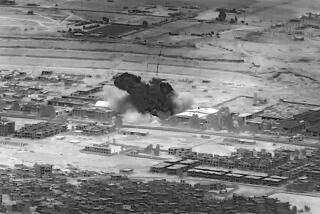The Iraq Policy Quest
- Share via
U.S. Air Force and Navy pilots patrolling the no-fly zones over northern and southern Iraq now have what their commanders have been asking for: presidential authority to conduct more assertive operations in response to intensified antiaircraft fire and increasing intrusions into prohibited air space by Iraqi fighters. Saddam Hussein ordered more aggressive defensive measures after last month’s four-day bombing campaign by American and British forces. His aim is to try to prove to his own people and others--including the U.N. Security Council--that even after eight years of sanctions and isolation he is neither powerless nor intimidated.
The new American rules of engagement allow pilots to attack Iraqi air defenses more broadly, not just in response to Iraqi action. The effectiveness of this strategy is not yet clear. The Pentagon has declared successful some operations in which radar and antiaircraft sites were bombed. After others it has kept silent. This week a missile armed with a 2,000-pound warhead went astray and hit a civilian area, causing casualties. Washington expressed regrets, but it is not about to change its operational plans.
Those operations are part of what the Clinton administration describes as its policy to contain Iraq. Just what containment involves has yet to be satisfactorily explained, but in the wake of Baghdad’s expulsion of the U.N. arms inspectors and the Security Council’s inability to agree on what should now be done to monitor Iraq’s secret weapons programs, the more aggressive air operations have become the lead policy by default. That does not mean it has the endorsement of Congress. As Senate Majority Leader Trent Lott (R-Miss.) put it, “The doctrine here has to be rollback, not containment.” To that end Congress last year passed the grandly named Iraq Liberation Act, which calls for spending $97 million to arm and encourage Iraqi opposition groups to overthrow Hussein.
The problem is that the opposition groups either can’t be depended upon to work together toward a common goal, as the bitterly divided Kurds in the north have shown, or they have no interest in taking up the U.S. offer, as the main Shiite opposition group in the south made clear last week. All this leaves little for the United States to work with. Yes, Iraq, still aggressive and threatening, has to be contained. What’s awaited is a policy free of illusions about how to accomplish that.
More to Read
Sign up for Essential California
The most important California stories and recommendations in your inbox every morning.
You may occasionally receive promotional content from the Los Angeles Times.













